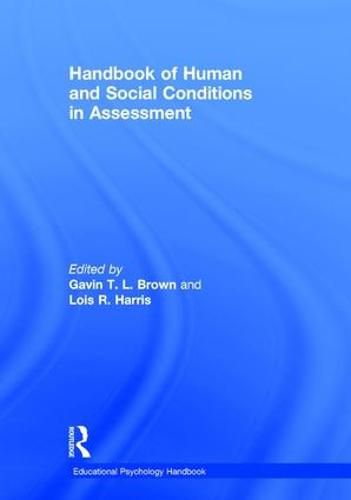Readings Newsletter
Become a Readings Member to make your shopping experience even easier.
Sign in or sign up for free!
You’re not far away from qualifying for FREE standard shipping within Australia
You’ve qualified for FREE standard shipping within Australia
The cart is loading…






The Handbook of Human and Social Conditions in Assessment is the first book to explore assessment issues and opportunities occurring due to the real world of human, cultural, historical, and societal influences upon assessment practices, policies, and statistical modeling. With chapters written by experts in the field, this book engages with numerous forms of assessment: from classroom-level formative assessment practices to national accountability and international comparative testing practices all of which are significantly influenced by social and cultural conditions. A unique and timely contribution to the field of Educational Psychology, the Handbook of Human and Social Conditions in Assessment is written for researchers, educators, and policy makers interested in how social and human complexity affect assessment at all levels of learning.
Organized into four sections, this volume examines assessment in relation to teachers, students, classroom conditions, and cultural factors. Each section is comprised of a series of chapters, followed by a discussant chapter that synthesizes key ideas and offers directions for future research. Taken together, the chapters in this volume demonstrate that teachers, test creators, and policy makers must account for the human and social conditions that shape assessment if they are to implement successful assessment practices which accomplish their intended outcomes.
$9.00 standard shipping within Australia
FREE standard shipping within Australia for orders over $100.00
Express & International shipping calculated at checkout
The Handbook of Human and Social Conditions in Assessment is the first book to explore assessment issues and opportunities occurring due to the real world of human, cultural, historical, and societal influences upon assessment practices, policies, and statistical modeling. With chapters written by experts in the field, this book engages with numerous forms of assessment: from classroom-level formative assessment practices to national accountability and international comparative testing practices all of which are significantly influenced by social and cultural conditions. A unique and timely contribution to the field of Educational Psychology, the Handbook of Human and Social Conditions in Assessment is written for researchers, educators, and policy makers interested in how social and human complexity affect assessment at all levels of learning.
Organized into four sections, this volume examines assessment in relation to teachers, students, classroom conditions, and cultural factors. Each section is comprised of a series of chapters, followed by a discussant chapter that synthesizes key ideas and offers directions for future research. Taken together, the chapters in this volume demonstrate that teachers, test creators, and policy makers must account for the human and social conditions that shape assessment if they are to implement successful assessment practices which accomplish their intended outcomes.